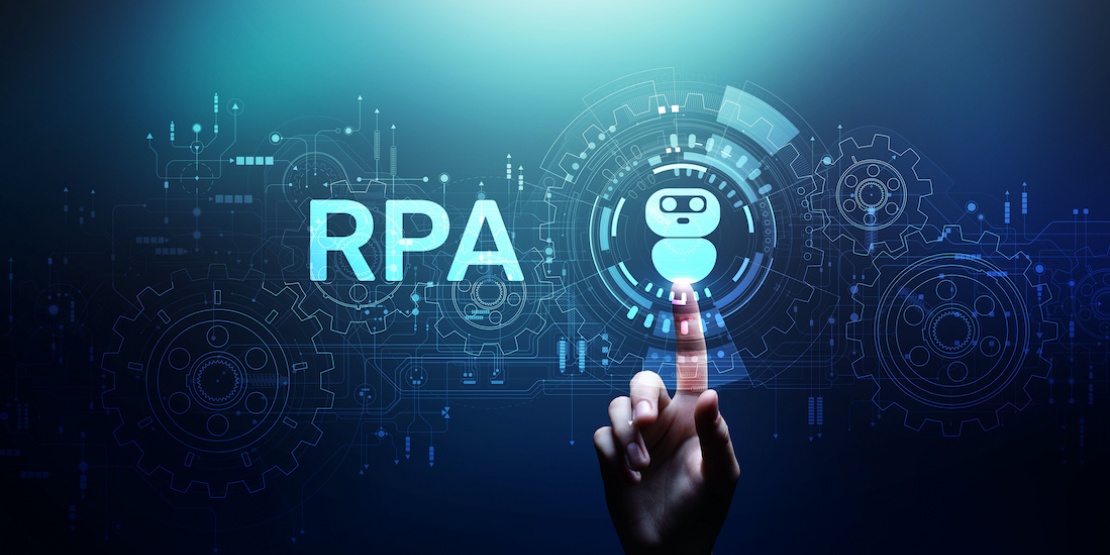With the digital revolution in full swing and businesses looking to become more resilient than ever, automation is gaining momentum. Gone are all the repetitive and time-consuming tasks, and teams are increasingly focusing on high-value-added tasks. To make this transition, companies use robotic process automation (RPA) or intelligent process automation (IPA), two complementary tools that help improve process efficiency.
RPA technology: Definition and operation
By definition, robotic process automation enables companies to automate repetitive and time-consuming tasks, which are then executed by software robots without human intervention.
Methodical and standardised routine processes and operations are carried out based on elementary rules and it is all done autonomously. This could be in the form of digital data entry, information gathering, sending e-mails or file management, for example. The human staff then process only the non-standard instances, the exceptions.
Software robots, also called digital robots or bots, can be deployed by the system in just a few weeks and cost very little to implement. Once in place, they are immediately operational, 24 hours a day, 7 days a week. In recent years, this digital technology has evolved to a certain level of maturity, paving the way for large-scale process automation.
RPA implementations: Use cases for procurement
According to the consulting firm McKinsey, 50–70% of tasks can be automated in procurement departments. This makes them ideal candidates for RPA, with multiple practical applications.
Many procurement processes can be automated via RPA software:
- Updates to supplier digital data;
- Entry of updated prices in supplier catalogues;
- Sending of reminders that certain documents still need to be sent in;
- Collection of documents following a call for tenders;
- Management of recurrent auctions;
- Analysis of file conformity;
- Anonymisation of data (see GDPR);
- Receipt and reconciliation of invoices;
- Processing of supplier requests;
- Monitoring and alerting about market and material indices;
- Transfer of information from one software (or Excel file) to another;
- Set-up of a robot assistant.
For procurement departments using the Source-to-Pay process, the possibilities appear to be endless! These robots can automate a large number of processes in terms of data management, risk management, supplier sourcing and transactions.
The benefits of RPA
Presented like this, RPA sounds like a dream come true for buyers. And for good reason, given the many benefits of this technology for procurement departments and for companies in general.
Leslie Willcocks, a professor in the Department of Management at the London School of Economics, has written a book on the subject. In an interview with McKinsey, she shares her insights: "The major benefit we found in the 16 case studies we undertook is a return on investment that varies between 30 and as much as 200 percent in the first year. But it’s wrong to look just at the short-term financial gains, particularly if those are simply a result of labour savings. That approach does not do justice to the power of the software, because there are multiple business benefits."
Such a return on investment is primarily related to increases in productivity. As well as making financial savings, RPA also boosts efficiency. RPA bots perform tasks quickly and accurately, reducing the number of errors. They are a huge time saver, both in terms of operational execution and solution development compared to other technology options.
At a time when the labour market is under pressure and has been impacted by the phenomenon of the ’Big Resignation’, automating these administrative and repetitive tasks plays a key role. It means you can improve your teams’ working day and thus build employee loyalty. This makes jobs more meaningful with more strategic tasks. Procurement teams can then focus on higher value-added jobs, such as data analysis or relations with stakeholders as well as decision-making.
Leslie Willcocks adds: "In the longer term, RPA means people will have more interesting work. For 130 years we’ve been making jobs uninteresting and deskilled. The evidence is that it’s not whole jobs that will be lost but parts of jobs, and you can reassemble work into different types of jobs. It will be disruptive, but organisations should be able to absorb that level of change."
IPA to take things to the next level
Intelligent Process Automation refers to a new generation of digital tools that apply to more complex processes. They are based on cognitive technologies that have come from Artificial Intelligence (AI) such as Machine Learning, Deep Learning, natural language processing, process mining, etc.
All of these aid humans with unusual or exceptional tasks that require thought, creativity, perception, ability, etc. To do this, these automation tools process all kinds of data (semi-structured or even unstructured data) or learn by observing human behaviour.
However, implementing such solutions takes more time as they require further configuration to fit specific business objectives and elaborate scenarios.
It is clear that the procurement function is very much undergoing a digital transformation. Although adopting these tools (RPA, IPA and AI) is still in its early stage in most companies, they point to an exciting future for the procurement function. The robotic automation of business processes will enable these departments to boost their efficiency at a lower cost, improve quality standards and foster their teams’ development. And they will be able to rely even more on smart automation to create added value.
- Download our "Long Tail Spend: Digitalise your transactions" white paper.









